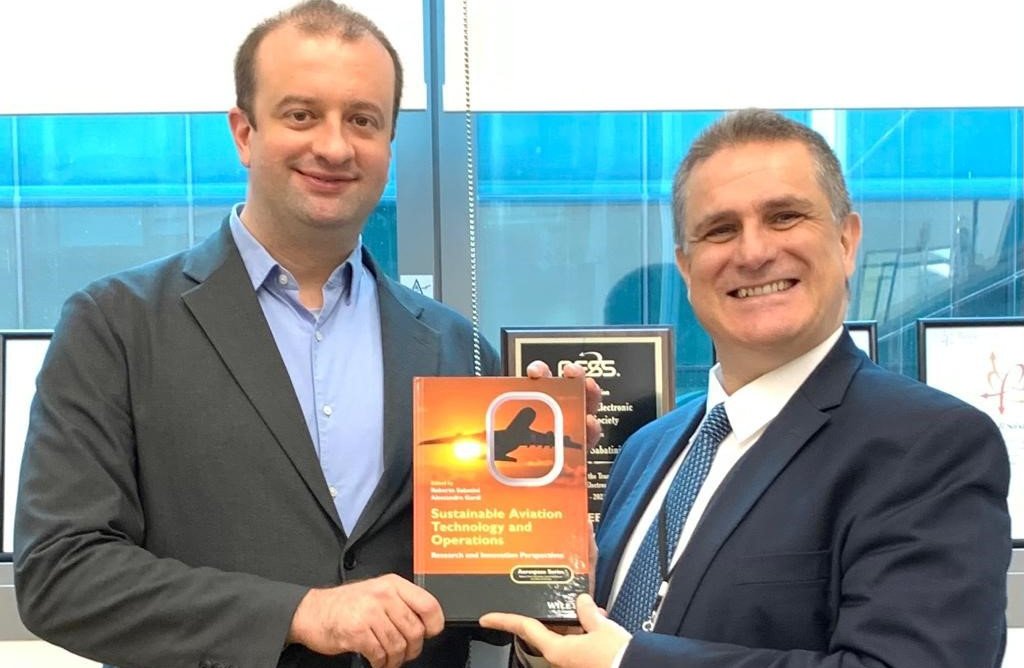
Advances in Systems Engineering and Lifecycle Management, Bridging Gaps between Academic Research and Industry Practices Highlighted
A book titled ‘Sustainable Aviation Technology and Operations: Research and Innovation Perspectives’ edited and co-authored by Khalifa University’s Dr. Roberto Sabatini, Professor and Dr. Alessandro Gardi, Assistant Professor, was released by multinational publishing company John Wiley & Sons. The 544-page hardcover and e-book offers a comprehensive and timely collection of recent research advances in aeronautics and air transport, with a focus on long-term sustainable development goals and current achievements.
This new and timely editorial initiative was presented during the COP28 UAE summit and covers a broad spectrum of topics including aircraft technologies, air traffic management, systems engineering, propulsion, aerodynamics, avionics, structures, materials, airspace management, biofuels, and sustainable lifecycle management.
Dr. Sabatini leads the Intelligent Aerospace Systems Group/Flight Systems Research and Training Initiative – FALCON Center Project, Department of Aerospace Engineering, and is affiliated with the Center for Cyber-Physical Systems (C2PS), Space Technology and Innovation Center (KUSTIC), and the Robotics and Intelligent Systems Institute (RISI). Dr. Gardi is affiliated to the same research entities and specializes in multi-objective trajectory optimization, optimal control methods, and AI/metaheuristics for air and space platforms.
The FALCON Center has seven ongoing projects and five more planned for 2024, which include the developments of a Multi-Domain Airspace Management Decision Support System; Hybrid-Electric VTOL Unmanned Aircraft Design and Flight Optimization; eVTOL Drone Wake Turbulence and Separation Modeling; and Urban Air Mobility Avionics and Flight Guidance Systems. Of these, two ongoing projects – the Design of a Hybrid Electric Drone for Sustainable Urban and Regional Air Mobility Design and Testing of a CubeSat for Climate Change Impact Assessment – were also presented at COP28 UAE.
Organized into four sections — Aviation Sustainability Fundamentals, Systems for Sustainable Aviation, Aerostructures and Propulsive Technologies, and Research Case Studies – the book also provides an in-depth understanding of the physical processes associated with various aircraft emissions, such as air pollutants, noise, and contrails, which are crucial for developing computational models for aircraft design, flight path optimization, and environmental impact assessment.
In addition, the book highlights relevant advances in systems engineering and lifecycle management processes, bridging existing gaps between academic research and industry best practices, and offering insights into the practical implementation of sustainable aviation solutions.
With three decades of experience in avionics, defense and robotics/autonomous systems research and education, Dr. Sabatini has secured more than US$20 million in research funding. Currently, his research projects aim to develop intelligent and sustainable aerospace systems, including innovative hybrid propulsion architectures for drones and urban air mobility vehicles, advanced navigation and guidance systems, and decision support tools for air and space traffic management.
Dr. Sabatini and Dr. Gardi have included a collection of 10 case studies from field experts that explore various contemporary topics, including the overall contribution of wingtip devices to improving aircraft performance, the integration of naturally occurring materials in lightweight aero-structures, development of a tailored design methodology for distributed and hybrid propulsion systems, hydrogen as an alternative aviation fuel, and integration of hybrid-electric propulsion systems in small unmanned aircraft, among others.
Alisha Roy
Science Writer
17 January 2024